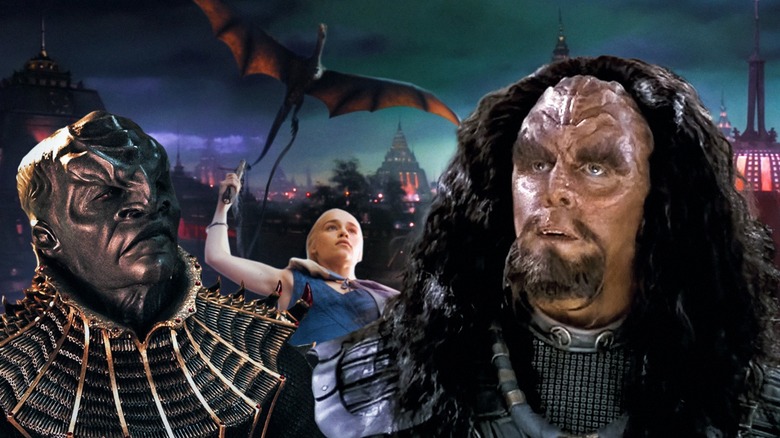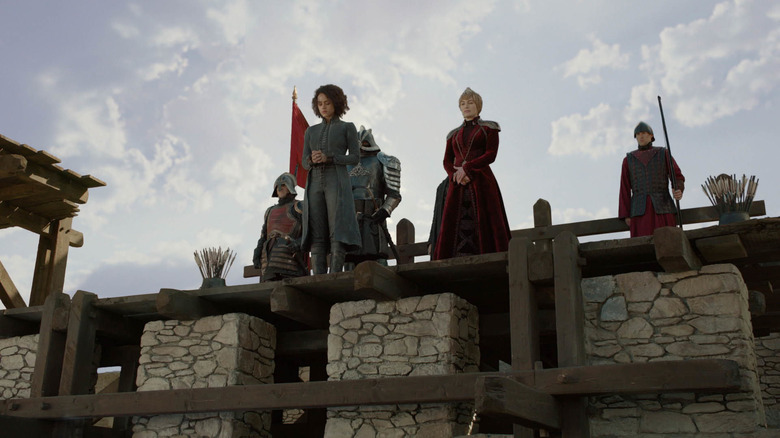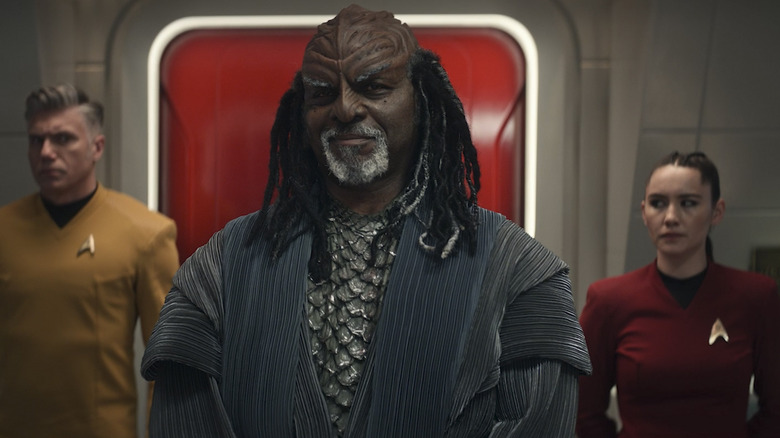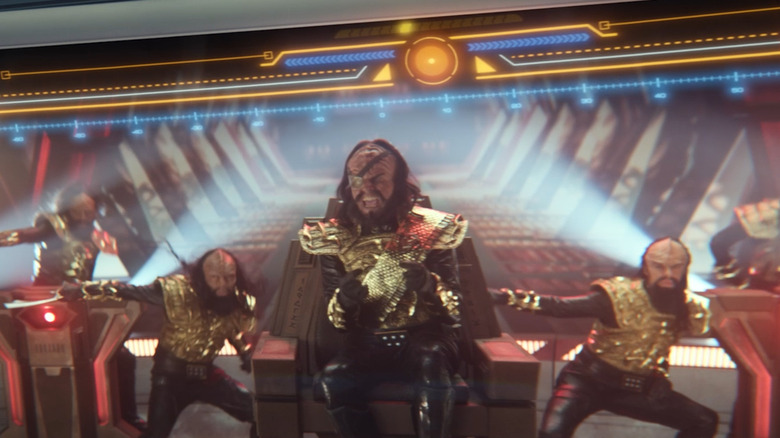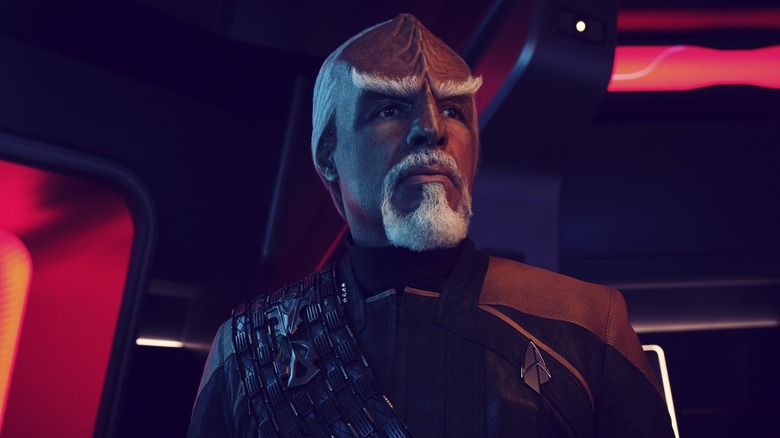A Klingon Empire Spin-Off Series Could Be Star Trek's Game Of Thrones
In the era of prestige television, the "Star Trek" formula can often feel stale.
That's not the fault of "Star Trek," of course. Watching old episodes is as nostalgic as it ever was. Newer efforts, though, have received more tepid responses than expected. "Discovery," and later, "Picard," were attempts at modernization, but ironically, recent "Star Trek" has only hit a true homerun by returning to its tried-and-true formula with "Strange New Worlds."
In that context, it's hard to ignore how much of the greater "Star Trek" universe remains unexplored, over a half-century after it first debuted. For all of the franchise's hundreds of worlds, alien species, and cultures, we keep going back to Earth and Starfleet. The next series in development is "Star Trek: Starfleet Academy," which will be a teen drama about Starfleet recruits. So, then, a PG-13 "Euphoria" with Kobayashi Maru tests? Is this really what fans want, or is it a misguided play to a younger demographic?
What's amazing about this is that the expansive universe of "Star Trek" leaves nearly endless room for different genres and storytelling. In fact, one idea seems so obvious that it's baffling it hasn't been tried: a series all about the Klingon Empire, without any Starfleet to hold it back.
Klingons are at the heart of "Star Trek," but they've never truly been allowed to hold centerstage. A Klingon Empire series could be one of the greatest and most unique in TV history — and, for all intents and purposes, the "Star Trek" equivalent to HBO's epic fantasy saga "Game of Thrones." Klingons are the franchise's most recognizable aliens, and their fascinating culture is ripe for that style of dark, serialized storytelling. And right now, a Klingon Empire series would truly revitalize "Star Trek" for a new era.
How Game of Thrones is the perfect model for a Star Trek: Klingon Empire series
Before we dive in, let's quickly define what we mean by a "Klingon Game of Thrones" means. To be clear, simply ripping off HBO's high fantasy series would be a recipe for disaster. Rather, the ingredients of George R. R. Martin's world that a Klingon Empire series should be influenced by are the Westerosi political intrigue, interpersonal conflict, the epic scale, the bingeable pacing, and of course, epic sword fights.
Immediately, Klingon culture lends itself to that style of show. They are beings who pride themselves on a militant kind of honor, who fight amongst each other even as they maintain an empire. There's even a fully fleshed-out fictional language! In other words, Klingons are very much a high fantasy concept stuffed into a science-fiction world.
One huge similarity to "Game of Thrones" is that both Westeros and the Klingon homeword Qo'noS are comprised of clans ruled over by a greater body — a monarch in Westeros and the Klingon High Council on Qo'noS. In fact, those clans are both referred to as houses. One almost has to wonder whether Martin took inspiration from "Star Trek" when coming up with his own fantasy world, or if the writers who came up with Klingon lore were simply drawing from the same historical pools of inspiration as he did. Either way, while Martin's inventions are bound by a single continent, the Klingons have an armada that spans across the stars, allowing for expansive storytelling on a different level and scale.
Star Trek's Klingon Empire series should be set prior to first contact with humans
When we first meet the Klingons in "Star Trek: The Original Series," they're in a conflict with Earth, paralleling the Cold War between the United States and Russia at the time the show aired. But for a potential "Star Trek: The Klingon Empire" series, it would be more interesting to explore the Klingon Empire before it contacted humans. Firstly, that's when the Empire was at the peak of its power. Secondly, it was at its most warlike.
Third, and perhaps most importantly, leaving humans out of the equation allows more creative freedom, since the writers wouldn't need to worry about how Starfleet is portrayed. Starfleet must adhere to high-minded ethical standards. It must be portrayed as a force for good, even if it occasionally falters. The stewards of the franchise are very protective of that portrayal, and for good reason. "Star Trek" is a hopeful vision of humanity growing beyond its tribalistic limitations.
Klingons don't carry that baggage. To truly be as great as "Game of Thrones," a Klingon series needs freedom to play in the darker areas of morality away from the confines of Starfleet, with an emphasis on its characters striving to claim power at all costs. After all, the mythology begins with the first two Klingons killing the gods that created them. It would be best if such a show could get a little bloody without soiling the pure-as-snow reputation of "Star Trek" more broadly. Moreover, human contact was the biggest wrench ever thrown into Klingon society, eventually leading to a shift in their warlike philosophy and a new age of peace. That's great for both species, but wouldn't be as interesting on TV.
Star Trek: The Klingon Empire could go where no human has gone before
Throughout "Star Trek," the rich lore of the Klingons has been developed one standalone episode at a time. Fans learned about the Rite of Ascension (basically a Klingon bar mitzvah) in one "The Next Generation" episode, and about the right of any Klingon to challenge a duel in another. But never has all that lore come together into a full narrative, which means the writers of a Klingon drama would have a lot of their work done for them. They'd need only to cobble together a narrative out of these disparate pieces, perhaps revolving it around an important period or event in the species' history.
One possible setting would be the very dawn of modern Klingon society.
Qo'noS was once ruled over by the warlord Molor during the planet's 9th century feudal period. He was deposed from power when the mythical hero Kahless the Unforgettable waged battle against him alongside the Lady Lukara. It's a fittingly medieval tale, with legions of troops assaulting fortresses and castles, legendary romance, and mythical weaponry, like the first Bat'leth forged in the fires of a volcano. In the wake of Molor's defeat, Kahless established the Klingon Empire, the early days of which would undoubtedly make for riveting television.
That setting is far enough back in history that only a few Klingons are known, so it would leave plenty of room for a show's writers to establish new characters. Perhaps we would even get to see the Great Houses form, with all the interpersonal and political conflict therein.
Today is a good day to watch a Klingon-style Game of Thrones
The bones of a great fantasy drama series are already embedded in Klingon lore, and the time is ripe for Paramount to pounce on the idea. Prestige TV is in a bit of a dry spot right now, and while great shows exist, nothing has the cultural power that once defined acclaimed series like "Breaking Bad," and yes, "Game of Thrones." That sense of must-watch TV that everyone will be talking about the next day is strangely absent these days, with perhaps the closest things being the latest Marvel or "Star Wars" miniseries on Disney+. If Paramount were to commit fully to the idea of a gritty Klingon drama, it could be an opportunity to recapture that kind of cultural moment.
A Klingon "Game of Thrones" analogue might even draw in audiences who traditionally haven't been interested in "Star Trek," while of course appealing to the die-hards who would welcome seeing the history of the franchise's most iconic aliens developed in greater detail. Because it would necessarily ditch the procedural tone of classic "Star Trek" shows while also dodging the shoot-em-up action the franchise tips into for projects like "Picard," it would straddle the line between sword-and-sorcery fantasy and science fiction.
This hypothetical series could be the path to qapla' (success) for the aging "Star Trek" franchise. The only question is whether the people with the power to make it happen have the courage to do so, or if their foreheads are too smooth to take the risk.
